PostTime:10/21/2022
The report of the 20th National Congress of the Communist Party of China points out that education, science and technology, and human resources are the foundational and strategic pillars for building a modern socialist country in all respects. We must regard science and technology as our primary productive force, talent as our primary resource, and innovation as our primary driver of growth.
University is a solid ground for knowledge and innovation. With strong research and academic atmosphere, Guangdong Technion - Israel Institute of Technology (GTIIT), a Sino-foreign cooperative university of science and engineering, attaches great importance to cultivating students' research and practical ability, exploration spirit and innovative thinking, and encourages them to participate in various scientific and creative activities during their undergraduate period.
GTIIT students have shown their talents in the "Climbing Program" for the last four years, demonstrating the creativity and wisdom of STEM students in youth innovation.
What is "Climbing Program"?
The Special Fund for the Cultivation of Guangdong College Students’ Scientific and Technological Innovation (“Climbing Program” Special Funds) aims to select and cultivate university students with sci-tech potential in Guangdong Province to carry out cutting-edge research. Through cultivation, incubation, competition and promotion, the project encourages and trains university students to innovate and create.
The applied projects are divided into three categories: scientific and technological invention; natural sciences academic papers; philosophy and social sciences investigation reports and academic papers.
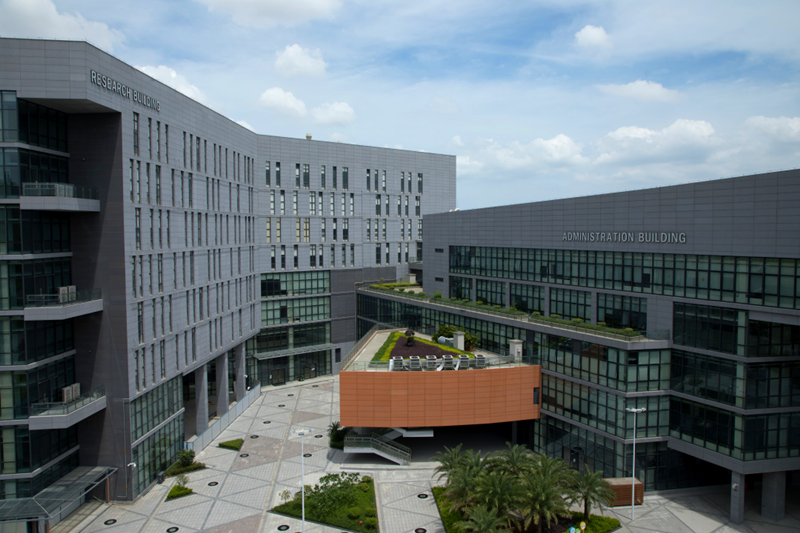
By now, GTIIT students have published papers on two projects: “Innovation and improvement of domestic fencing materials” by Jiang Haocheng and Yao Xingyu (Class of 2017, MSE); and “Exploring the relationship between microstructure and mechanical properties of TNM alloy (Ti-Al-Nb-Mo) under different annealing conditions” by Lin Qia and Liu Xuqi (Class of 2018, MSE). Members of the two projects have published articles as co-first authors in the famous journal Metals (SCI) respectively.
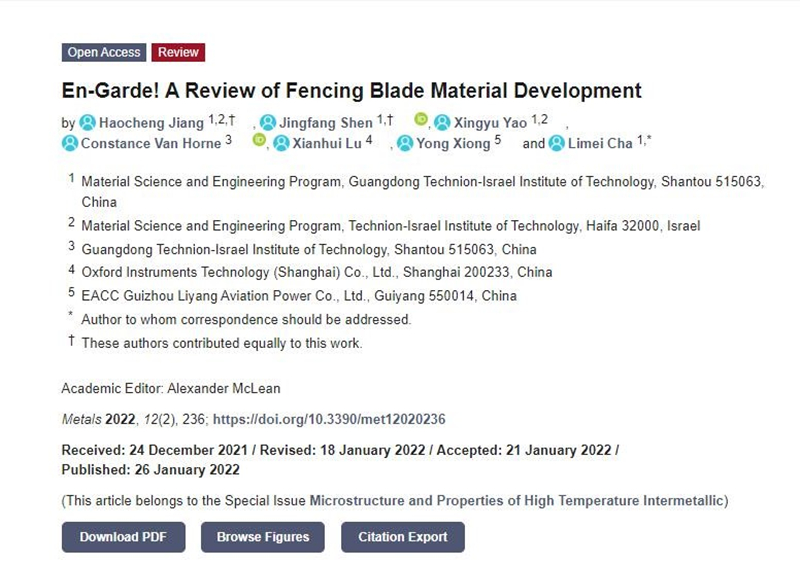
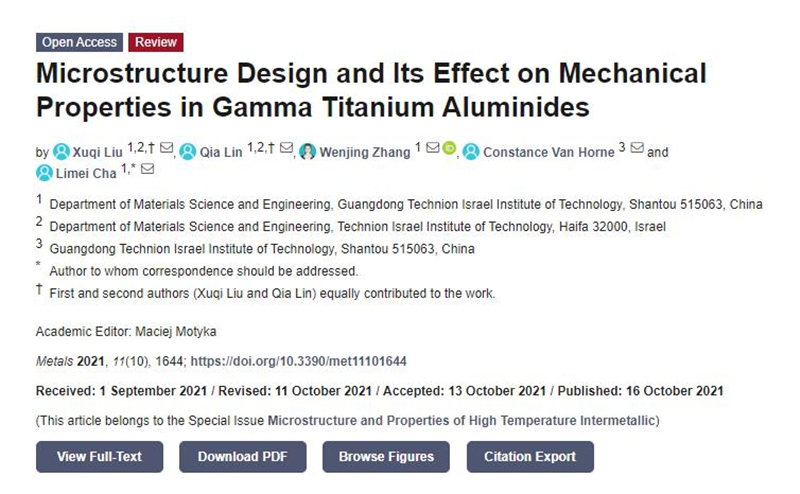
Dr. Cha Limei, supervisor of the two projects, was deeply impressed by the students' learning attitude. “It is common to have different and inspiring opinions in our discussion. I remember once Xuqi questioned me, through which we realized that there was another way to understand the problem we discussed. I think teaching and learning coexist.”
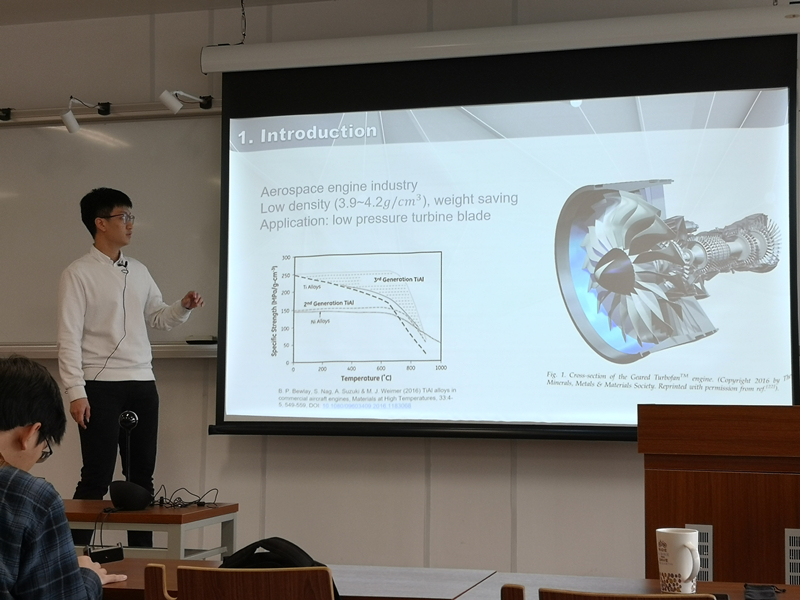
According to Dr. Cha, independent thinking is indispensable in scientific research. “The students would ask their English teacher Connie for polishing the articles. I was even more pleased that they were willing to learn the reason for the modification. Many students ask ‘why?’ and accept the answers from teachers without thinking. However, scientific research is not that easy. It is good to ask questions, but it is also important to think independently once you get answers.”
Haocheng said his first experience in the research team gave him a deeper understanding of materials program. “In the project, I know how to apply the professional knowledge I have learned to scientific research, and I can also pick up the knowledge that I neglected before when I encounter practical problems. As the person in charge of the project, I should no longer look at problems from the perspective of a student. I need to follow up the process, solve the problems, communicate with my team members, and adjust the plan according to the situation. Although there were many difficulties, the project was successfully completed with the help of my teachers and electronic microscopy center, and I also get my first SCI paper.”
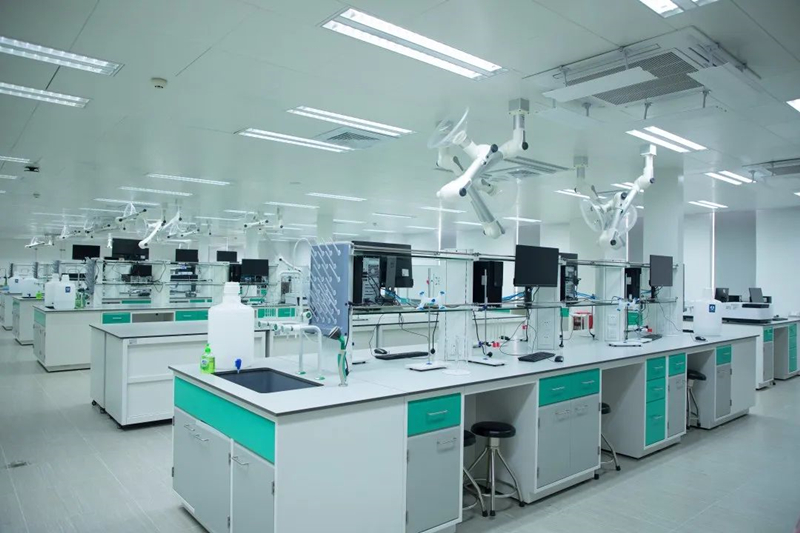
Lin Qia and Xuqi said Dr. Cha has helped them a lot when they were beginners in research. “She introduced the classic literatures in the field and told us how to find articles and whose papers to read. This allows us to understand the core and progress of this unfamiliar area from the beginning. When writing of the article, we often discussed how to write the article and how to express the key points clearly. Our English teacher Connie gave us advice on English writing to make the expression more accurate. We started by looking up and organizing relevant literature, finished a review and finally published our first article. It was a valuable experience during my undergraduate years.”
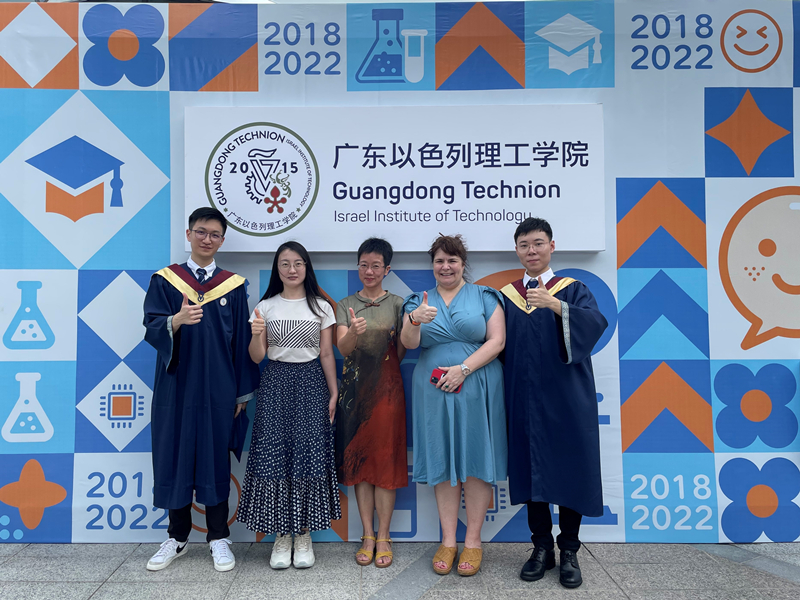
“Scientific research is a long-term process, and students need to balance research and study if they want to participate in projects under high academic pressure at GTIIT.” Dr. Cha pointed out that doing research required a sense of responsibility, new ideas and also a detailed plan. “It is important to have an idea, but it is more important to get it off the ground since there are always difficulties in practice. We should not only have dreams, but also maps and equipment. It also takes courage, confidence and execution to find what you need.”
In addition to the above projects, there are five other approved projects.
Characterization of ureolytic bacterial strains from e-waste area and their biocalcification ability in soil heavy metal immobilization —Yang Yifan
Sustainable aquatic residue recycling and organic soil remediation solutions —Li Yilin, Yu Peirong, Zeng Yuying, Zou Yunfan, Lin Yu, Liu Xinya, Wang Xiuqi, Wang Yanbo
Exploring the relation between the training times and the testing accuracy of back-propagation algorithm (focusing on the deep convolutional neural network distinguishing the handwriting digits)—Lin Zehui
Explore the effect of phenolic stabilizer (Phenols) in low density polyethylene 1840H —Guo Yuanyuan, Lin Jiashu, Ling Yuxiang, Xian Weiran
Tea waste extraction using ionic liquid and the special VOCs indicator to the product purity —Zhi Dexiang, Li Weiran
Participating in scientific research during undergraduate study enables students to learn about the academic frontier and develop correct research attitude in practice. GTIIT has provided various opportunities for students to join research groups. Students who are interested in research should pay attention to relevant information to get the chance.
Text/Photos: GTIIT News & Public Affairs
© GUANGDONG TECHNION-ISRAEL INSTITUTE OF TECHNOLOGY | 粤ICP备17036470号
